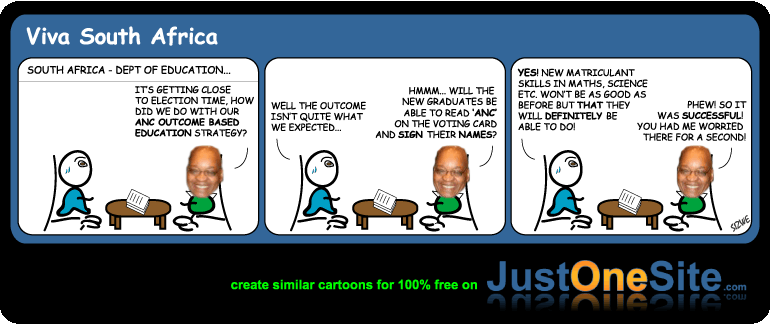I realised while writing the title of this post that many people, particularly the South Africans reading this article, will have no idea what outcome based education is. This is probably a good thing.
Outcome-based education (OBE) is a teaching model that rejects the traditional focus on what schools provide to students – viz. education. Sorry – that was hard to resist. OBE is a teaching method that attempts to coach students to demonstrate that they “know and are able to do” whatever the required outcomes of a particular task are.
Many countries, including South Africa, define their OBE standards so that they focus on core subjects such language, mathematics, science, and history, without referring to attitudes, social skills, or moral values. This tends to work amazingly well if you live and interact in a culture-less bubble.
Outcomes generally include a range of skills and knowledge. According to Wikipedia:
Generally, outcomes are expected to be concretely measurable, that is, “Student can run 50 meters in less than one minute” instead of “Student enjoys physical education class.” A complete system of outcomes for a subject area normally includes everything from mere recitation of fact (“Students will name three tragedies written by Shakespeare”) to complex analysis and interpretation (“Student will analyze the social context of a Shakespearean tragedy in an essay”).
Again, in theory this is great. Where everything tends to collapse is when young students are introduced into the mix. Add in the OBE method of grading and promoting students and you’ve got a recipe for disaster.
In theory, OBE students are evaluated against absolutes not against their peers. So, for example, a student is promoted if they know x% of the total material, where x is determined by the education authorities – ever wonder about those miraculous pass rate statistics you read improving year by year? Genetically superior, intellectually enhanced post-apartheid children or X-files material – you decide.
Basically, in OBE, a students current performance is compared to their own prior performance rather than their performance relative to their peers. Cut it how you will, in real terms what this translates to is that it is practically impossible for a student to ‘fail’.
Even those who would not achieve a passing grade in a traditional age-based approach can be recognized for their concrete, positive, individual improvements.
Hurrah for all you employers out there.
If you enjoyed this, you might also enjoy reading this education related cartoon: Julius Malema matric results. If all this is far too depressing for you, perhaps consider some personal coaching to help you cope, or better yet buy lotto tickets online and hope to win so you can send your kids to a private school in South Africa.



 (18 raters, Click a star a star to rate this article)
(18 raters, Click a star a star to rate this article) .
.








I agree – OBE dumbs down education. Still it doesn’t explain the relatively poor quality of graduates coming out of the South African university system these days – unless they have adopted some kind of OBE system too. I cannot imagine in my day that students could protest because too many of them failed a course! And then of course blame it all on apartheid.. why not – easier than working hard!
It seems everything is coming down to the lowest common denominator rather than raising the game to bring everyone to a higher level.. I guess it’s easier to go downward for the government to show any sort of results in the statistics.
Keep everybody dumb, so they can read only ANC – like the cartoon says…and that’s enough! If they’re too clever, they can take on the Government and wow! That can’t be allowed!
Sue.. exactly!! the worst part is that the people that it’s all happened to – the recent students now eligible to vote – don’t even realise it and will wind up voting for ANC again believing the promises of a better future. No amount of BEE is going to employ them all in productive roles if they have no solid skills
Well I need to approach my sons school as they have failed him, so this is possible, when through the year all is well and come this last term he fails, i cannot believe this, I am going to fight for him to be promoted as I know that he is quite capable of achieving and maybe just needs a bit more attention from the teachers at school instead of them bringing the kids down they should see as to what they can do to assist and help there students. Very worried and upset parent.
Tammy… I would have thought, as I’m sure you did, that the new system is intended to have a more holistic approach to grading and promotion. The idea is not to rely on a final exam to decide on promotion but rather the performance of the child over the course of the year.
If you say your child did well throughout the year and just did not come through in the last term then I think it’s definitely worth enquiring where the teachers felt your child came short and whether the grading decision was appropriate. At the very least they should provide you with concrete specifics in terms of what your child’s development needs are. Hope all works out well.. God bless
Love your post!! Finally someone got it right!!!
i think everything is debatable in South Africa when i look at minimum recquirements to pass matric are very low but admission to university is total different, i thing our government needs to pay full attention to this because there are many students who fails to get admission at tertiary level.